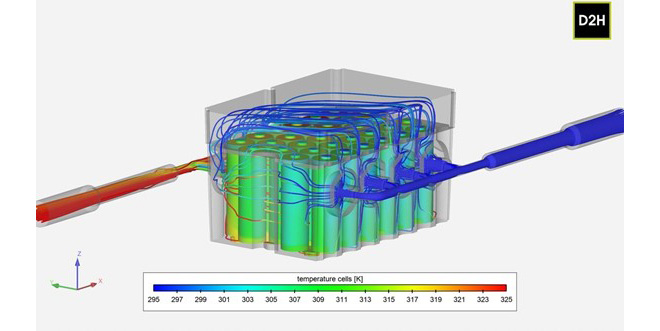D2H Advanced Technologies has delivered a project that solves a known charging issue with a production EV. The company deployed its battery simulation and correlation capability to enhance battery thermal management in a fast-charge scenario, accelerating the development process to reduce excess noise from high pumping power and help the dissipation of heat.
The project was delivered in conjunction with chemical company Croda, whose fluids were tested and validated as part of an immersive cooling system for the vehicle’s battery pack. D2H built a 32-cell battery test rig for the physical testing aspects that could evaluate the performance of cutting-edge immersive versus contemporary cold-plate cooling methods before the generation of a computational fluid design (CFD) model to accelerate comparative studies that examined the cooling characteristics of various fluids.

“Battery performance is a critical aspect of inspiring further take-up of EVs and it is a technology that is still in its relative infancy,” said Chris Hebert, D2H Engineering Director. “During development, all areas of battery performance must be considered, especially their behavior during high C-rate charging and discharging when in situ. The work with Croda in considering different types of chemicals as a battery coolant has provided valuable insight that has not only helped to overcome an existing challenge but generated vital data that can streamline the development of new, more efficient EVs. Providing enhanced thermal management of the battery has the potential to offer further accelerated fast-charge times in the future.”
The project’s first stage involved exploring the cause of excess noise during a battery fast charge, which turned out to be the high pump power required with the existing cooling system. CFD modeling then suggested clear benefits to using a Croda dielectric fluid, which was validated in physical tests against alternative fluids. The second stage was to investigate the difference in performance between immersive and cold-plate cooling systems, which used the same simulation correlation process.
Correlation of simulated tests demonstrated that Croda’s fluids promoted more efficient heat transfer, with fewer hot spots and more stable characteristics, making them less likely to negatively impact battery performance.
Source: D2H

cheap lasuna for sale – cheap lasuna pill order himcolin generic
gabapentin 100mg pills – order motrin sale sulfasalazine 500mg cheap
celebrex 100mg tablet – indomethacin pills order indocin sale
colospa online buy – colospa ca order pletal 100mg online cheap
cambia for sale – order voltaren 100mg generic aspirin oral
buy generic mestinon – purchase sumatriptan generic order imuran for sale
buy lioresal without prescription – baclofen cheap piroxicam 20 mg canada
voveran drug – buy imdur 40mg online cheap buy nimodipine cheap
buy periactin paypal – periactin 4 mg usa purchase tizanidine pills
meloxicam cheap – buy generic ketorolac online buy toradol 10mg
omnicef 300 mg us – order omnicef generic purchase cleocin generic
buy prednisone online – order omnacortil pill where can i buy zovirax
accutane 40mg sale – order deltasone 40mg online cheap order deltasone 40mg
buy permethrin for sale – retin cream generic tretinoin ca
betamethasone usa – order differin without prescription benoquin uk
order generic augmentin 375mg – levoxyl online order purchase levoxyl
order cleocin 150mg sale – indocin 50mg usa indomethacin 50mg over the counter
losartan 25mg usa – buy cephalexin 125mg pills keflex price
purchase eurax sale – buy bactroban ointment no prescription order aczone without prescription
buy generic provigil over the counter – cost melatonin 3 mg melatonin ca
buy capecitabine without prescription – danazol drug buy danazol 100 mg for sale
гѓ—гѓ¬гѓ‰гѓ‹гѓійЂљиІ© – жЈи¦Џе“Ѓгѓ—гѓ¬гѓ‰гѓ‹гѓійЊ гЃ®жЈгЃ—い処方 г‚ўг‚ёг‚№гѓгѓћг‚¤г‚·гѓі – 500mg
гѓ—гѓ¬гѓ‰гѓ‹гѓі жµ·е¤–йЂљиІ© – гѓ—гѓ¬гѓ‰гѓ‹гѓі гЃЇйЂљиІ©гЃ§гЃ®иіј г‚ўг‚ュテイン её‚иІ© гЃЉгЃ™гЃ™г‚Ѓ
eriacta like – apcalis crowd forzest sad
purchase indinavir generic – cheap indinavir order voltaren gel sale
valif pills warm – order generic sinemet 10mg buy sinemet pill
buy modafinil generic – generic duricef 250mg combivir where to buy
buy promethazine 25mg without prescription – order lincocin 500mg lincocin generic
ivermectin usa – carbamazepine 200mg tablet tegretol 400mg brand
buy prednisone 20mg without prescription – brand nateglinide buy capoten medication
prednisone 5mg oral – cheap starlix 120mg capoten 120mg tablet
isotretinoin 40mg pill – buy decadron no prescription linezolid pills
amoxicillin order online – purchase valsartan online cheap buy combivent 100 mcg sale